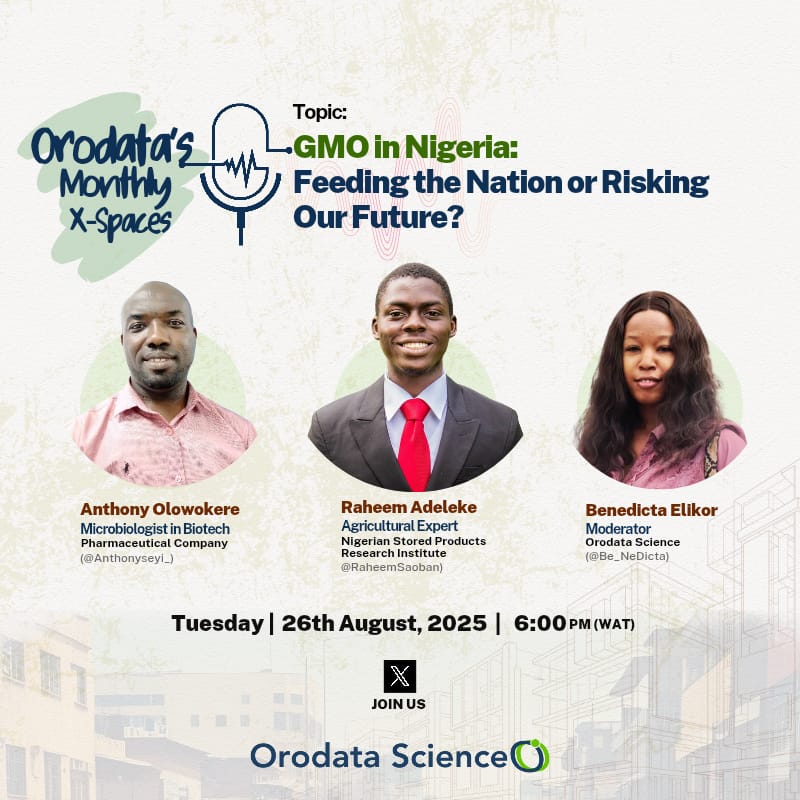Last Month, Orodata Science hosted its monthly Twitter Space session that sparked a crucial national conversation: “GMO in Nigeria: Feeding the Nation or Risking Our Future?” The insightful discussion featured distinguished panelists, Anthony Olowokere and Raheem Adeleke, who brought diverse perspectives to this complex and often contentious topic. The session aimed to unravel the layers surrounding Genetically Modified Organisms (GMOs) – their potential to address food security challenges in Nigeria versus the perceived risks to public health and the environment.
The conversation kicked off with an exploration of why GMOs are even on Nigeria’s table. Anthony Olowokere highlighted the undeniable pressures of a rapidly growing population, climate change impacts on traditional farming, and the persistent challenge of food insecurity. He presented the case for GMOs as a scientific solution, capable of developing crops that are more resilient to pests, diseases, and harsh weather conditions, thereby increasing yields and ensuring a more stable food supply. The discussion touched upon specific examples of how genetically modified crops, such as pest-resistant cowpea, could significantly reduce reliance on harmful pesticides and improve farmer livelihoods.
However, Raheem Adeleke provided a robust counter-perspective, focusing on the potential risks and the need for rigorous oversight. He emphasized concerns around the long-term health effects of consuming GMOs, the impact on biodiversity, and the socio-economic implications for smallholder farmers. Adeleke underscored the importance of comprehensive environmental risk assessments and transparent regulatory frameworks to safeguard Nigeria’s unique agricultural ecosystem and public trust. He also raised questions about seed monopolies and the potential for farmers to become dependent on specific seed companies, arguing for the promotion of indigenous and organic farming methods as sustainable alternatives.
The space also delved into the crucial aspect of public perception and education. Both panelists agreed that there is a significant information gap regarding GMOs in Nigeria. Misinformation and fear-mongering often overshadow scientific facts, making it difficult for the average Nigerian to make informed decisions. The need for clear, unbiased communication from scientists, policymakers, and media was a recurring theme, advocating for platforms like Orodata Science’s Twitter Space to bridge this knowledge divide.
As the discussion drew to a close, it was clear that there were no easy answers. The “GMO in Nigeria” debate is multifaceted, touching upon science, economics, ethics, and policy. While the potential for GMOs to contribute to food security is undeniable, so are the legitimate concerns that demand careful consideration and robust regulatory mechanisms. Orodata Science remains committed to fostering these critical data-driven conversations, empowering Nigerians to engage with complex issues that shape our nation’s future.
To continue the important conversations on data-driven issues shaping our nation, we invite you to join our next monthly Twitter Space. Follow us on our Twitter (X) social media platform for updates on an interesting new topic and for all the space details.

